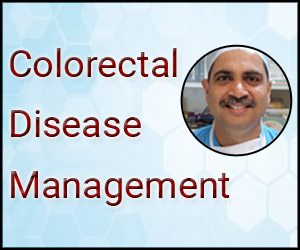- Home
- Editorial
- News
- Practice Guidelines
- Anesthesiology Guidelines
- Cancer Guidelines
- Cardiac Sciences Guidelines
- Critical Care Guidelines
- Dentistry Guidelines
- Dermatology Guidelines
- Diabetes and Endo Guidelines
- Diagnostics Guidelines
- ENT Guidelines
- Featured Practice Guidelines
- Gastroenterology Guidelines
- Geriatrics Guidelines
- Medicine Guidelines
- Nephrology Guidelines
- Neurosciences Guidelines
- Obs and Gynae Guidelines
- Ophthalmology Guidelines
- Orthopaedics Guidelines
- Paediatrics Guidelines
- Psychiatry Guidelines
- Pulmonology Guidelines
- Radiology Guidelines
- Surgery Guidelines
- Urology Guidelines
Changing trends in Colorectal Disease management- Dr Yogesh Palshetkar

Among all the Digestive Diseases, the upper gastrointestinal tract and the hepatobiliary system have been given far more attention than the Colorectal Diseases, as far as the research and technology is concerned. This is probably because of the fact that human beings can survive even without the Hindgut. But the scenario is changing very fast and the Coloproctology (medicine dealing with disorders of the Rectum, Anus, and Colon) is emerging as a distinct speciality in India.
In the last couple of decades, medical engineering has rapidly progressed. The sophistication & advancement has touched almost all the fields including Coloproctology. Laparoscopy, Robotics, use of staplers, use of lasers & Endoscopes and newer imaging techniques has dominated the picture.
PICK UP EARLY, FIX IT FAST: Colonoscopy, though still remains as the leading diagnostic modality, its resolution has excelled to such an extent that we use to equate it to a microscope. Patients with Colorectal malignancies when detected at T1NoMo or in-situ stage, have very good prognosis and survival rates.
ENDOANAL ULTRASOUND: It is especially useful in Duke’s Classification of the colorectal malignancies and in case of evaluation of the anal sphincters for incontinence.
MR DEFECOGRAPHY is the dynamic MRI study of the defecation act. It gives immense information in case of obstructed defecation and the pelvic organs prolapse. India still needs a lot of Colorectal Physiology Laboratories which can evaluate such disorders.
MINIMAL ACCESS, MINIMAL INVASION: Laparoscopy and Robotic surgeries are the real game- changers in the surgical sophistication. The new vessel sealers and Harmonic Scalpel have made the Hemicolectomies and Anterior resection for low rectal malignancy easy and more promising.
TRANS-ANAL ENDOSCOPIC MICROSURGERY (TEM) is being used to resect a small tumour in the distal rectum through a special endoscopic technique without a need to open the abdomen. Uses of staplers in colorectal surgery have minimized the human errors while resection of bowels, bowel anastomosis and now they are being used for the pile's surgery.
TIME SAVED IS THE MONEY EARNED: Most of the anorectal surgeries like Stapled Hemorrhoidopexy, Laser Therapy for Piles, etc. have become a ‘Day Care’ procedures. The focus is being given to the early resumption to the work and painless nature of the procedure. Though these techniques are available with a substantial price, people go for them so as to save their productive time.
CHANGING CONCEPTS: Unlike the popular belief, fissure in anon is the number one cause for anal bleeding. Its treatment is mainly conservative and almost 90% fissures can be conserved. It is found that the resting anal pressure is maintained due to the internal Anal Sphincter. Diltiazem 2% ointment is used to reduce this pressure and to save the surgery.
THE FUTURE: I am sure the future era is of artificial intelligence and more preventive and pre-emptive procedures will dominate the treatment. Genetic studies will lead us for more predictive treatment. However, we must also work towards cutting down the cost and making these advents more affordable to the larger section of the society.
Dr Yogesh Palshetkar is a Gastrointestinal Surgeon, Fortis Hospital, Kalyan.

Disclaimer: This site is primarily intended for healthcare professionals. Any content/information on this website does not replace the advice of medical and/or health professionals and should not be construed as medical/diagnostic advice/endorsement or prescription. Use of this site is subject to our terms of use, privacy policy, advertisement policy. © 2020 Minerva Medical Treatment Pvt Ltd